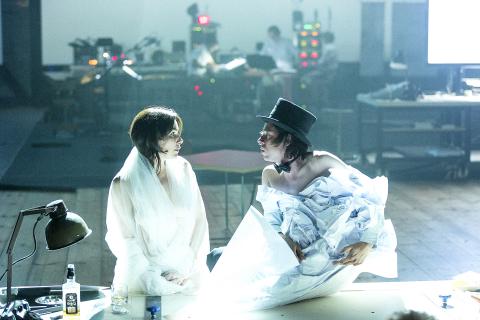Dutch national theater company Toneelgroep Amsterdam (TGA) is returning to Taipei this weekend after a two-year hiatus to close the Taipei International Arts Festival.
The troupe, led by its avant-garde artistic director Ivo van Hove, is to perform its thought-provoking, four-hour-long production adapted by Koen Tachelet from the novel The Fountainhead by controversial American author and philosopher Ayn Rand.
A play containing grand ideas about society and the relationship between the individual and the collective, the story follows Howard Roark, played by poet, actor and former Dutch “poet of the fatherland” Ramsey Nasr, who for this production learned to sketch architectural designs in the style of US architect Frank Lloyd Wright.

Photo courtesy of Jan Versweyveld and TGA
An ambitious and virtuous architect, Roark is willing to bear the ultimate sacrifice for his ideas: To forgo friendship and love, to be rejected by society and, ultimately, to destroy his own creation for the integrity of his architectural ideal.
This lonely process acquires another dimension when the protagonist meets Dominique Francon, powerfully played by lead actress Halina Reijn, who manifests herself as a kindred spirit as well as a formidable opponent in a relationship that is alternately creative and destructive — and which receives much attention in this stage rendering.
Since her breakthrough with The Fountainhead in 1943, Rand and her following have been a force to reckon with, where the author — who preached a philosophy of extreme rational self-interest dubbed Objectivism and reportedly features prominently on the reading shelves of US President Donald Trump and Speaker of the House of Representatives Paul Ryan — is in equal measures admired and reviled.
However, no such politically laden history of controversy exists in the Netherlands, where TGA staged the novel, which is not as widely read in Europe, but has inspired generations of architects and artists.
This has allowed the director to approach the material with fresh eyes, resulting in a play that conveys the full emotional depth of the story, but does not eschew giving Rand’s ideas full stage, whether through archetypal characters that personify the ideas at war in the story or a powerfully rendered double monologue that receives full stage, a flourish that, contrary to the novelist’s original, gives equal voice to both sides of the ethical dilemma facing the architect.
Dutch daily NRC Handelsblad said Van Hove has managed to keep a precariously balanced perspective, “cautiously guiding Rand past the abyss of her own ideology.”
The production is designed by Jan Versweyveld, who has cooperated with Van Hove on a series of high profile plays in recent years. While grand-scale designs do not always benefit a play’s intimacy, Versweyveld’s visually rich multimedia approach and spectacular stage are ideally suited to a story that combines ideas, intrigue and architectural design.
Live music is performed onstage and scenes are projected on a large screen, allowing the audience to follow the process of architectural creation.
The play is performed in Dutch, with English and Chinese surtitles, runs for four hours with an intermission and includes “adult content” — nudity, smoking and blood scenes.
Pre-talks are held 30 minutes before every performance in the theater’s lobby, with a post-show talk after the matinee on Sunday.

On April 26, The Lancet published a letter from two doctors at Taichung-based China Medical University Hospital (CMUH) warning that “Taiwan’s Health Care System is on the Brink of Collapse.” The authors said that “Years of policy inaction and mismanagement of resources have led to the National Health Insurance system operating under unsustainable conditions.” The pushback was immediate. Errors in the paper were quickly identified and publicized, to discredit the authors (the hospital apologized). CNA reported that CMUH said the letter described Taiwan in 2021 as having 62 nurses per 10,000 people, when the correct number was 78 nurses per 10,000

As we live longer, our risk of cognitive impairment is increasing. How can we delay the onset of symptoms? Do we have to give up every indulgence or can small changes make a difference? We asked neurologists for tips on how to keep our brains healthy for life. TAKE CARE OF YOUR HEALTH “All of the sensible things that apply to bodily health apply to brain health,” says Suzanne O’Sullivan, a consultant in neurology at the National Hospital for Neurology and Neurosurgery in London, and the author of The Age of Diagnosis. “When you’re 20, you can get away with absolute

May 5 to May 11 What started out as friction between Taiwanese students at Taichung First High School and a Japanese head cook escalated dramatically over the first two weeks of May 1927. It began on April 30 when the cook’s wife knew that lotus starch used in that night’s dinner had rat feces in it, but failed to inform staff until the meal was already prepared. The students believed that her silence was intentional, and filed a complaint. The school’s Japanese administrators sided with the cook’s family, dismissing the students as troublemakers and clamping down on their freedoms — with

As Donald Trump’s executive order in March led to the shuttering of Voice of America (VOA) — the global broadcaster whose roots date back to the fight against Nazi propaganda — he quickly attracted support from figures not used to aligning themselves with any US administration. Trump had ordered the US Agency for Global Media, the federal agency that funds VOA and other groups promoting independent journalism overseas, to be “eliminated to the maximum extent consistent with applicable law.” The decision suddenly halted programming in 49 languages to more than 425 million people. In Moscow, Margarita Simonyan, the hardline editor-in-chief of the